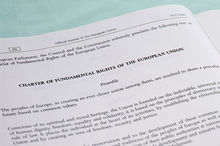
Back ميثاق الحقوق الأساسية للاتحاد الأوروبي Arabic Carta de los Derechos Fundamentales de la Xunión Europea AST Харта на основните права на Европейския съюз Bulgarian Carta dels Drets Fonamentals de la Unió Europea Catalan Listina základních práv Evropské unie Czech EU's Charter om Grundlæggende Rettigheder Danish Charta der Grundrechte der Europäischen Union German Χάρτης των Θεμελιωδών Δικαιωμάτων της Ευρωπαϊκής Ένωσης Greek Ĉarto de Fundamentaj Rajtoj de la Eŭropa Unio Esperanto Carta de los Derechos Fundamentales de la Unión Europea Spanish
| Charter of Fundamental Rights of the European Union | |
|---|---|
 The preamble of the Charter | |
| Created | 2 October 2000 |
| Ratified | 7 December 2000 |
| Author(s) | European Convention |
| Signatories | Institutions and member states of the European Union |
| Purpose | Consolidate and enshrine the broad array of rights afforded to citizens of the European Union |
| Official website | |
| www | |
| Full text | |
The Charter of Fundamental Rights of the European Union (CFR) enshrines certain political, social, and economic rights for European Union (EU) citizens and residents into EU law. It was drafted by the European Convention and solemnly proclaimed on 7 December 2000 by the European Parliament, the Council of Ministers and the European Commission. However, its then legal status was uncertain and it did not have full legal effect[1] until the entry into force of the Treaty of Lisbon on 1 December 2009.
The Charter forms part of the area of freedom, security and justice (AFSJ) policy domain of the EU. It applies to all the bodies of the European Union and Euratom which must act and legislate in accordance with its provisions, as the EU's courts will invalidate any EU legislation or ruling assessed as non-compliant with the Charter.
The EU member states are also bound by the Charter when engaged in implementation of the European Union law. However, Poland has been granted a partial opt-out from enforcement of the CFR in spite of participating in the AFSJ; in contrast, Denmark and Ireland have fully adopted the Charter, in spite of having been granted opt-outs from the AFSJ (a general and a partial one, respectively).
- ^ Craig, Paul; Grainne De Burca; P. P. Craig (2007). "Chapter 11 Human rights in the EU". EU Law: Text, Cases and Materials (4th ed.). Oxford: Oxford University Press. p. 15. ISBN 978-0-19-927389-8.